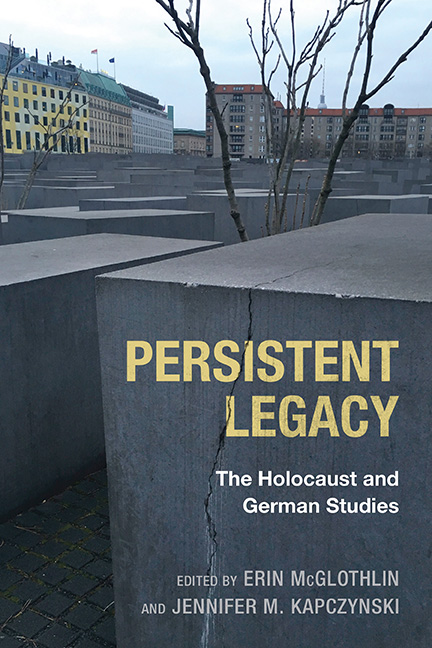Book contents
- Frontmatter
- Contents
- Acknowledgments
- Introduction
- Part I Abiding Challenges
- Part II The Holocaust in German Studies in the North American and the German Contexts
- Part III Disentangling “German,” “Jewish,” and “Holocaust” Memory
- Part IV Descendant Narratives of Survival and Perpetration
- Part V Remediated Icons of Memory
- Part VI Holocaust Memory in Post-Holocaust Traumas
- Notes on the Contributors
- Index
9 - Laying Claim to Painful Truths in Survivor- and Perpetrator-Family Memoirs
Published online by Cambridge University Press: 17 June 2021
- Frontmatter
- Contents
- Acknowledgments
- Introduction
- Part I Abiding Challenges
- Part II The Holocaust in German Studies in the North American and the German Contexts
- Part III Disentangling “German,” “Jewish,” and “Holocaust” Memory
- Part IV Descendant Narratives of Survival and Perpetration
- Part V Remediated Icons of Memory
- Part VI Holocaust Memory in Post-Holocaust Traumas
- Notes on the Contributors
- Index
Summary
COMPARISONS BETWEEN the experiences of the offspring of Holocaust survivors and the offspring of perpetrators of the Nazi Judeocide first began to be made quickly after those individuals reached maturity, though I am unable to determine with certainty whether it was initially by laypeople, scholars, or mental-health professionals. This similarity surely came into focus in the general public's mind in the mid-1980s with the publications of journalist Peter Sichrovsky's twin volumes of interviews with children of survivors and children of perpetrators. Like Sichrovsky, I, too, got started on a comparative track by first studying children of Holocaust survivors. In several conference papers and then in a book chapter, I described my investigation of strategies of authentication in such works. I proposed the term “Holocaust family memoir” as a subgenre of life writing that draws heavily on the experiences of family members of the author.
While the texts that made up that first corpus of mine are diverse in medium, style, tone, and aesthetic merit—including Art Spiegelman's pathbreaking comix Maus, Anne Karpf's bitter The War After, Helen Fremont's investigative After Long Silence, Lisa Appignanesi's elegiac Losing the Dead, and Martin Lemelman's tender Mendel's Daughter— they share a desire to fill in later generations’ gaps in knowledge about what the parental generation experienced during the Nazi Judeocide. The texts subsequently produced include the story of what happened to family members in the Shoah and the story of the offspring-author tracking down that story. The latter usually sheds some light on the dynamics of the postwar family unit.
As demonstrated repeatedly in Sichrovsky's Schuldig geboren, long before the appearance of that volume children and siblings of perpetrators of Nazi crimes had begun trying to make sense of taboo subjects in their families and the gaps and inconsistencies in the stories they had been told. Many memoirs and memoir-like texts have now been published that detail their authors’ discoveries of what their parents, siblings, or other close relatives did during the Nazi period, and the challenges of living with such knowledge. These memoirs, like those by the children of survivors, concern themselves with at least two generations of one family and present at least two stories, one that involves more centrally the parental generation during the war and one that concerns how the younger generation came to know more fully what their elders perpetrated.
- Type
- Chapter
- Information
- Persistent LegacyThe Holocaust and German Studies, pp. 178 - 193Publisher: Boydell & BrewerPrint publication year: 2016

